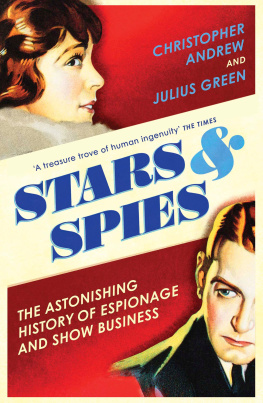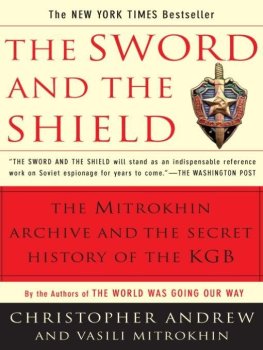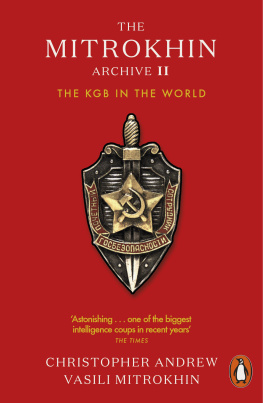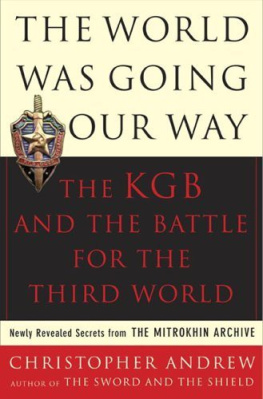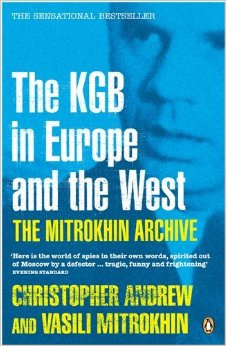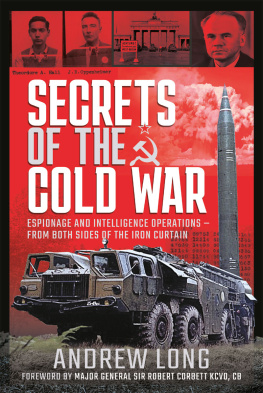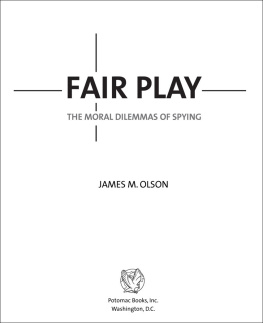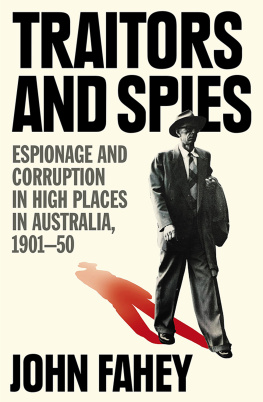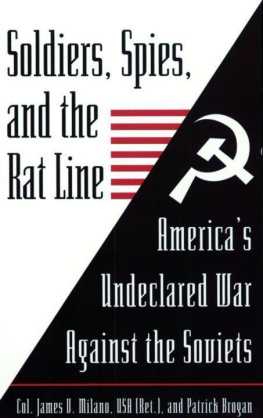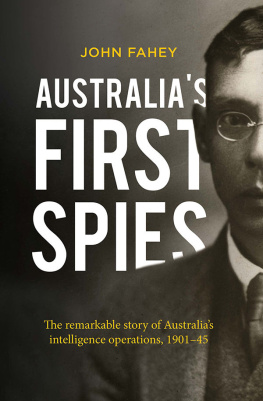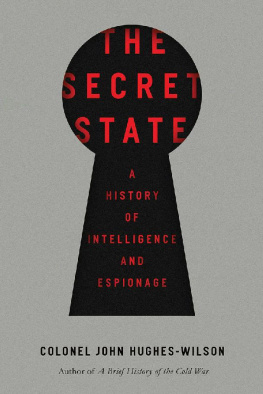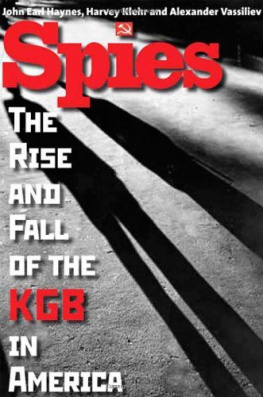Christopher Andrew
and
Julius Green
STARS AND SPIES
Intelligence Operations and the Entertainment Business

VINTAGE
UK | USA | Canada | Ireland | Australia
New Zealand | India | South Africa
Vintage is part of the Penguin Random House group of companies whose addresses can be found at global.penguinrandomhouse.com.

First published in Vintage in 2022
First published in hardback by The Bodley Head in 2021
Copyright Christopher Andrew and Julius Green, 2021
The moral rights of the authors have been asserted
Cover details from a film poster for Perfect Crime by Bert Glennon, 1928, Everett Collection/Bridgeman Images
ISBN: 978-1-473-55828-1
This ebook is copyright material and must not be copied, reproduced, transferred, distributed, leased, licensed or publicly performed or used in any way except as specifically permitted in writing by the publishers, as allowed under the terms and conditions under which it was purchased or as strictly permitted by applicable copyright law. Any unauthorized distribution or use of this text may be a direct infringement of the authors and publishers rights and those responsible may be liable in law accordingly.
For Dianne and Jenny
Introduction
The Art of Deception
Interplay between the worlds of entertainment and espionage goes back at least 2,500 years. The fact that one relies on publicity and the other on secrecy, that stars live in the spotlight and spies in the shadows, might seem to rule out successful symbiosis between the two professions. A famous entertainer is generally a successful entertainer, while a famous spy is most often either a failed spy or an ex-spy. Both professions, however, often require similar skills and sometimes attract similar personalities. This book investigates the affinities between these two worlds of smoke and mirrors, and examines the overlapping expertise of some of their leading players.
The adoption of a fictional persona, the learning of scripts and the ability to improvise are central to both professions, and undercover agents often find themselves engaged in what is effectively an exercise in long-form role play. In the early twentieth century, Mansfield Cumming, the first chief of Britains foreign intelligence service, SIS (also known as MI6), purchased his disguises from the same theatrical costumier as the leading West End theatres. His heads of station abroad included a number of leading theatricals. We like your poetical reports immensely, Cumming wrote to one of them. Please send us some more. Role play remains compulsory for todays recruits to SIS and the Security Service MI5, all of whom pretend to have other jobs. During his thirty-three-year career in SIS before becoming its chief in 1999, Richard Dearlove used to travel the world extensively in different identities well supported with bank accounts, credit cards, everything you needed.
A number of entertainment industry luminaries performers, writers, directors and other creative practitioners have at one time or another tried their hands at espionage. The transitory lifestyle of itinerant entertainers is often not dissimilar to that of many spies, and this can make them peculiarly well suited to undercover work a fact which intelligence services have sometimes been able to exploit to good effect. Frances most internationally renowned playwright at the end of the Ancien Rgime was also its leading spy, whose operations led to Britains first defeat in the American War of Independence. Some enthusiastic entertainer-spies, however, proved out of their depth. Those executed for German espionage during the First World War ranged from the manager of the Bijou Picture Theatre in Finchley Road, London, to the upmarket international exotic dancer, Mata Hari.
While the roles of both stars and spies have evolved over the centuries, their priorities have changed little. Though the primary responsibility of spies remains to steal secrets, they have also been used for a variety of other covert activities. From Elizabethan times onwards, talented entertainers have been involved in a diverse series of influence operations. The most successful and outrageous attempt ever made by a British intelligence agency to deceive a US president came not from an intelligence professional but from a professional entertainer recruited for the purpose, who later became head of BBC TV Light Entertainment. Given the colourful dramatis personae involved over the centuries in both espionage and show business, it is unsurprising that the lines between fantasy and reality have sometimes been blurred. It now seems that the foreign intelligence reports sent by Britains first successful female dramatist in the mid 1660s were probably invented though they provide remarkable evidence of her creative imagination.
Some of the most successful deceptions in intelligence history have drawn on the skills more commonly found in a film studios scenery, props and make-up departments. There is a strong argument that an intelligence agency which shows the creative imagination of a successful film studio will have a clear advantage over less imaginative opponents as in Operation M INCEMEAT during the Second World War when German intelligence was deceived by the British into believing that the corpse of a homeless Welshman carrying fake documents was that of a Royal Marine officer bearing genuine top-secret plans for an Allied invasion. One of the CIAs most successful deceptions, the Canadian Caper in Iran, was based on the creation of a bogus film studio. The leader of the operation, who was also chief of Agency disguise, graphics and (false) authentication, later entitled his memoirs The Master of Disguise: My Secret Life in the CIA.
The best known assassination by a twentieth-century intelligence agency, the killing of Leon Trotsky by Stalins NKVD in Mexico City in 1940, was also a triumph of role play and deception. The Spanish assassin, Ramn Mercader, a Soviet illegal agent, posed successively as the Belgian Jacques Mornard and the Canadian Frank Jacson. He gained access to Trotsky by seducing his confidante Sylvia Ageloff, an American Trotskyist. Ageloff said later that until Mercader struck Trotsky a fatal blow on the back of his head with a concealed ice pick, she had never doubted the sincerity of Mercaders love for her. Some less homicidal twenty-first-century Russian illegals in the United States have posed so successfully as Americans or Canadians that even their own children had no idea they were either Russian or spies.
Some spies, however, have not found it necessary to play anyone other than themselves. As with the old clich of the murder weapon displayed on the mantelpiece, undercover operators can sometimes find it most effective to conceal themselves in plain sight. A celebrity performer is uniquely placed to do this, and, like the famous American actor who assassinated Abraham Lincoln in the presidents theatre box, enjoys access all areas privileges which any professional spy would envy rubbing shoulders with politicians and royalty, and sometimes sharing their confidences. While it may well have been possible for Englands first playwright-spy, Christopher Marlowe, to work undercover for some years without being identified, despite the popularity of his plays, the development of modern mass media meant that by the time Nol Coward found himself undertaking minor but colourful intelligence-gathering missions in America during the Second World War, he was an instantly recognisable figure and had no option but to play himself. What is interesting in this case is that, in the performance of his duties, he appears to have adopted an exaggerated portrayal of his own persona almost as if he was consciously playing the character of a spy.

